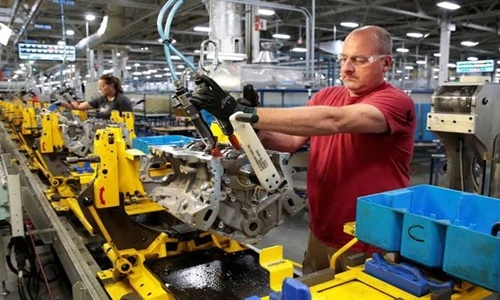You see, whatever physical item or product you buy from the market, had to have been manufactured at some point, somewhere, and by someone, right? Well, that creation process of the end product is called manufacturing, and it is pretty much the backbone of many sectors around the globe. Looking at that, if you have decided to start a manufacturing business of your own, then you might be here to gather more details about that. Correct? Well, we are here with all the possible advantages and disadvantages of manufacturing business, so that you can decide for yourself whether to get yourself into such a business or not. Alright, let’s get going.

Advantages of Manufacturing Businesses
1. Steady Demand
Manufacturing is key to both the economy and daily life, ensuring that the need for what it produces stays steady and predictable. As you know, manufacturing companies provide all those basic items that a person needs to go about their daily life. This ultimately translates into a regular flow of demand and money, making it an industry with relatively stable forces compared to other industries. And with that reliable demand, manufacturers can plan long-term, invest in the operation, and make new products with much less worry about them being rejected by the market, you know?
2. High Profits
See, a major benefit of manufacturing is the chance to make high profits. This is because with more products manufactured, there is a reduction in the cost per item, and, at the same time, quality items create a scope for higher selling prices, increasing your profit. If you are in a manufacturing sector that has the scope for growth, then the profit for sure can be quite expansive and rise over time. One can also be able to make more profits because of improving their production process and reducing waste.
3. The Use Of Technology
The manufacturing industry often leads the way in using new technologies, which can greatly improve how much is produced and how well things are made. Advanced tools, like automation, robots, and high-level software, basically speed up the rate of production and, on the other hand, increase the level of product quality too. The use of these technologies, in a way, will keep the manufacturer in the market while serving the customers really well.
4. Control Over Production
Having control over the whole production process is a big plus too, especially if high quality and customization are important in your market. When you’re making your own product, you control everything from the raw materials right through to the final product. This control might not appear as a big impact, but the thing is, with this you can pretty much make sure that every item meets your high standards and fits your business’s values.
5. Ability to Scale
As your manufacturing business gets bigger, you can scale up to meet more demand. For manufacturers, scaling could mean growth in the production capacity, addition of new product types, or entry into new markets. Scalability helps one to catch up with increasing demand and shifts in the market. That, in essence, means a thriving business is going to last, and that ultimately is a good thing.
6. Diversifying Products and Markets
A strong manufacturing operation lets you broaden your range of products and explore new markets. Diversification is always a wise strategy for reducing risk in regard to market change. By extending the range of products offered or the geographic areas served, you can connect with new customers and lessen the effects of market downturns in any one place and keep on repeating this when expanding your manufacturing business.
Disadvantages of Manufacturing Businesses
1. High Costs to Start and Operate
See, starting a manufacturing business often requires a lot of money upfront for machines, technology, and buildings. These are real initial costs, especially for this field. Secondly, the costs that one has to run the equipment, maintain the equipment, buy the materials used in production, and pay the workers will most certainly eat into your profits. As a business owner, as a business owner, you should be prepared for the costs and have a good plan for handling them in such a way that it will not become a big problem in making money.
2. Rules and Regulations
And just like any other business out there, there sure are a lot of rules that a manufacturing business must follow. These rules make sure that everything is safe, of good quality, and does not harm the environment. Understanding and following them can be pretty tough, and not following them can result in big fines, legal problems, and harm to your reputation. So, it’s highly important to know these rules well and ensure your business is following them in case you are thinking about starting a manufacturing business.
3. Risk of Outdated Technology
In a world where technology changes fast, there’s always a chance that the technology you buy today might be outdated tomorrow. And it happens way more often than you think. This may make your manufacturing less effective or force you to spend more to bring your systems up to date. Sure, you’d have to keep up with the technology, but this does carry financial risks that have to be handled very carefully.
4. Problems with Supply Chains
Manufacturing businesses often depend on a global network for their materials and parts. Such a dependency frequently results in problems of delays in delivery, higher costs, or even compromises in quality in the case of materials when the suppliers are based in politically and economically volatile areas. Having a strong strategy for your supply chain is important to avoid these problems and keep your business running smoothly.
5. Competition in the Market
And finally, see, the manufacturing sector is very competitive, with many businesses trying to win over customers. Strong competition usually means that you cut prices, which could in turn lower your profits. You have to find new ways to constantly be better, work more efficiently, and make your products stand out from what others have to in order to succeed or should we say “keep going”.
Final Thoughts
All in all, starting a manufacturing business is a good idea, as long as you have figured out what to manufacture, how to manufacture, and all those things. If there is demand for the product you are manufacturing, then you are pretty much good to go.

Meet Suhas Harshe, a financial advisor committed to assisting people and businesses in confidently understanding and managing the complexities of the financial world. Suhas has shared his knowledge on various topics like business, investment strategies, optimizing taxes, and promoting financial well-being through articles in InvestmentDose.com


